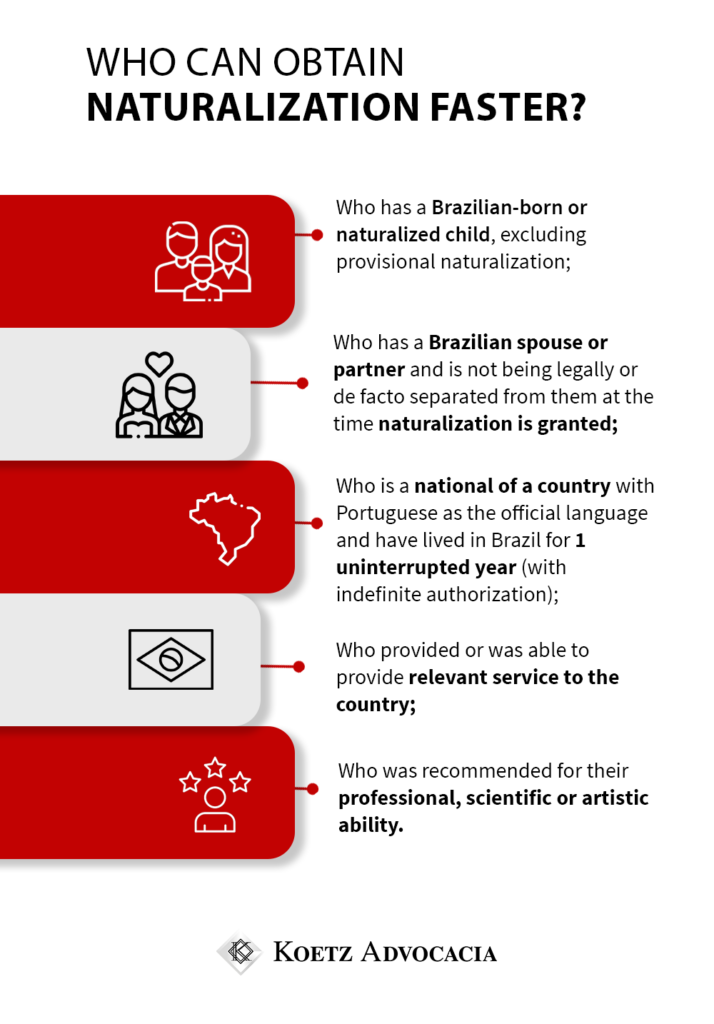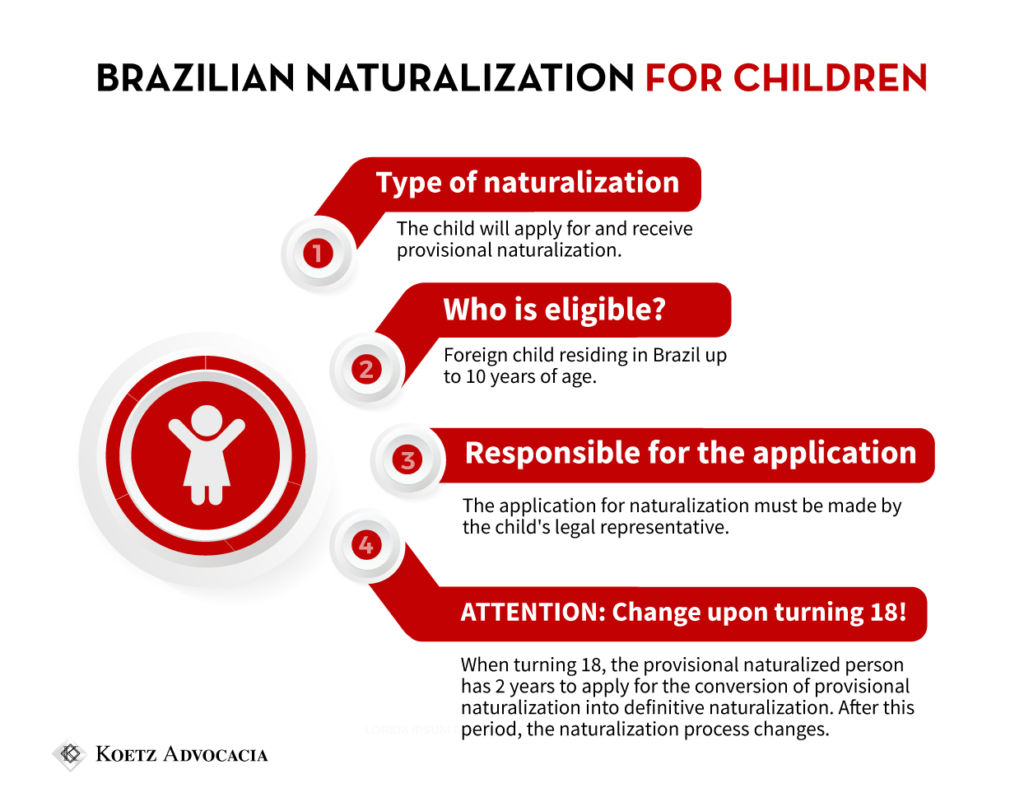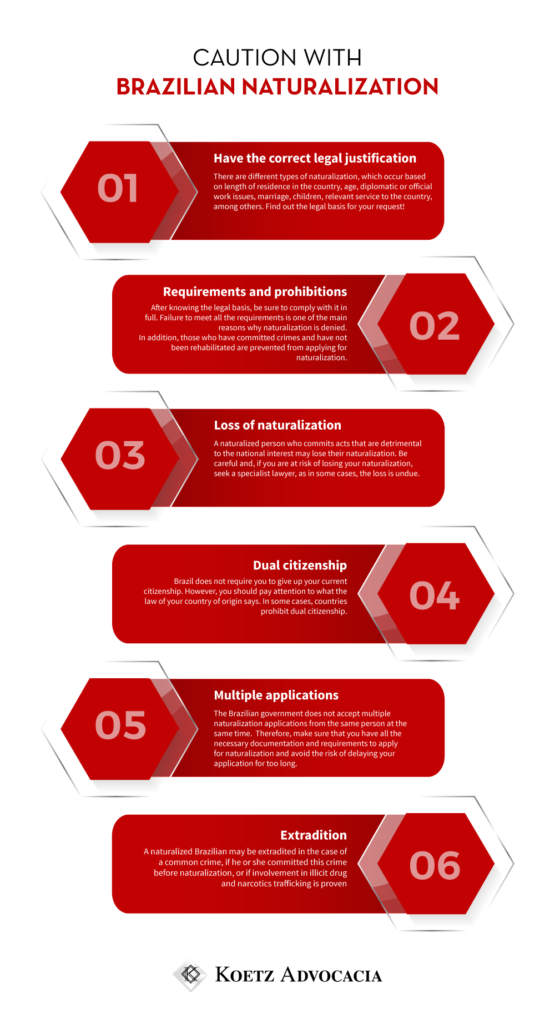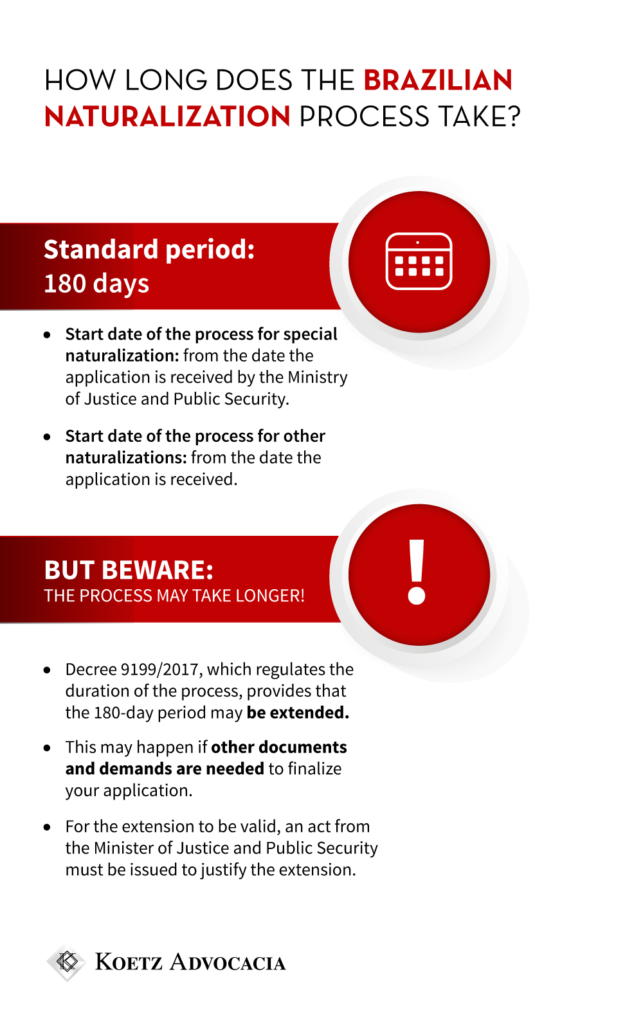
Migration, Visas and Residence of Foreigners to Brazil /
What are the types of Naturalization for foreigners in Brazil?
The new Brazilian Migration Law regulated the possibilities of naturalization for foreigners in Brazil. Learn more about what are the types of Naturalization — ordinary, extraordinary, special, and provisional.
If you need legal assistance from our team, please message us on WhatsApp.
What is Naturalization for foreigners in Brazil?
Naturalization for foreigners in Brazil is the act by which the individual voluntarily acquires Brazilian nationality, which is not his birthplace. That is, he becomes a citizen of a country he was not born in, but loses his original nationality.
“Art. 12. Are Brazilians:
II – naturalized (who hold citizenship):
- Those who, under the terms of the law, acquire Brazilian nationality, required from Portuguese-speaking countries only residence for one uninterrupted year and moral suitability;
- Foreigners of any nationality residing in the Federative Republic of Brazil for more than fifteen uninterrupted years and without criminal conviction, provided they apply for Brazilian nationality”.
It’s important to point out that naturalization and nationality are different, since a person can have more than one nationality. Thus, nationality refers to the country of birth or the country where you have citizenship according to the conditions and laws of a given country.
The text continues after the infographic.

Types of naturalization for foreigners in Brazil
There are four forms of naturalization for foreigners in Brazil. They are: ordinary, extraordinary, special, and provisional.
What are the types of Naturalization: Ordinary Naturalization
Naturalization for foreigners in Brazil in the ordinary modality is granted to an individual who proves:
- Have civil capacity, according to Brazilian law;
- Residence in the country, for a minimum period of four years (but it can be reduced, as explained below);
- Ability to communicate, read, and write in Portuguese;
- No criminal conviction or proof of rehabilitation.
Proof of residence in the country must be effectively demonstrated. That is, just the possession or ownership of a property in national territory is not sufficient proof for naturalization for foreigners in Brazil.
As for the minimum period of four years, this can be shortened:
For one year if the naturalized person meets one of the following requirements:
- have a Brazilian-born or naturalized child (with the exception of provisional naturalization);
- or have a Brazilian spouse or partner and are not legally separated.
For two years if the individual meets any of the requirements:
- having provided or being able to provide a relevant service to the Country;
- or be recommended for their professional, scientific, or artistic capacity.
Those individuals who are from Portuguese-speaking countries will be able to prove residence for only one uninterrupted year and moral suitability to obtain naturalization for foreigners in Brazil.
The text continues after the infographic.

What are the types of Naturalization: Extraordinary Naturalization
Naturalization for foreigners in Brazil in the extraordinary modality will be granted to that person who:
- prove that you have been living in Brazil for over fifteen years without interruption;
- not have a criminal conviction.
However, possession or ownership in the country alone is not sufficient for proving purposes. The person must prove effective residence in the country. However, sporadic trips abroad by the interested party will not prevent the approval of the request for naturalization for foreigners in Brazil in the extraordinary modality.
What are the types of Naturalization: Special Naturalization
Naturalization for foreigners in Brazil in the special modality will be granted in two cases:
- to the spouse or partner, for more than five years, of a member of the Brazilian Foreign Service in activity or of a person in the service of the Brazilian State abroad;
- or, still, to be or have been employed in a diplomatic mission or in a consular post in the country for more than ten consecutive years.
Therefore, the requirements for the concession are:
- Have capacity, according to Brazilian law, to communicate in Portuguese;
- Does not have a criminal conviction or is rehabilitated.
What are the types of Naturalization: Provisional Naturalization
Provisional naturalization for foreigners in Brazil may be granted to children or adolescents who have taken up residence in Brazil before reaching the age of ten. Thus, the entire process must be requested by a legal representative of the child or adolescent.
After the individual reaches civil majority, if he so wishes, he must expressly request the Ministry of Justice and Public Security to change his provisional naturalization to a definitive one.
For this purpose, this change must take place within two years after reaching civil majority (18 years).
The text continues after the infographic.

Information on the application procedure for the naturalization application
Naturalization processes are requested at Federal Police units through electronic scheduling (via the website), however, addressed to the Ministry of Justice.
The text continues after the infographic.

In the application, the person must present all the documents provided according to the type of naturalization. It is important to point out that extra documents and due diligence may be requested to complement the process – according to each case.
The decision of the process will be published in the Official Gazette of the Union. Once the request for naturalization is granted, the naturalized person must deliver his/her National Migration Registration Card to one of the Federal Police units. If the request is rejected, an appeal can be filed.
The text continues after the infographic.

Questions about Naturalization for foreigners in Brazil?
Any questions about the naturalization process can be answered by one of our consultants. Please contact us if you need help with the process or have any questions about how to proceed.
If you need legal assistance from our team, please message us on WhatsApp.

